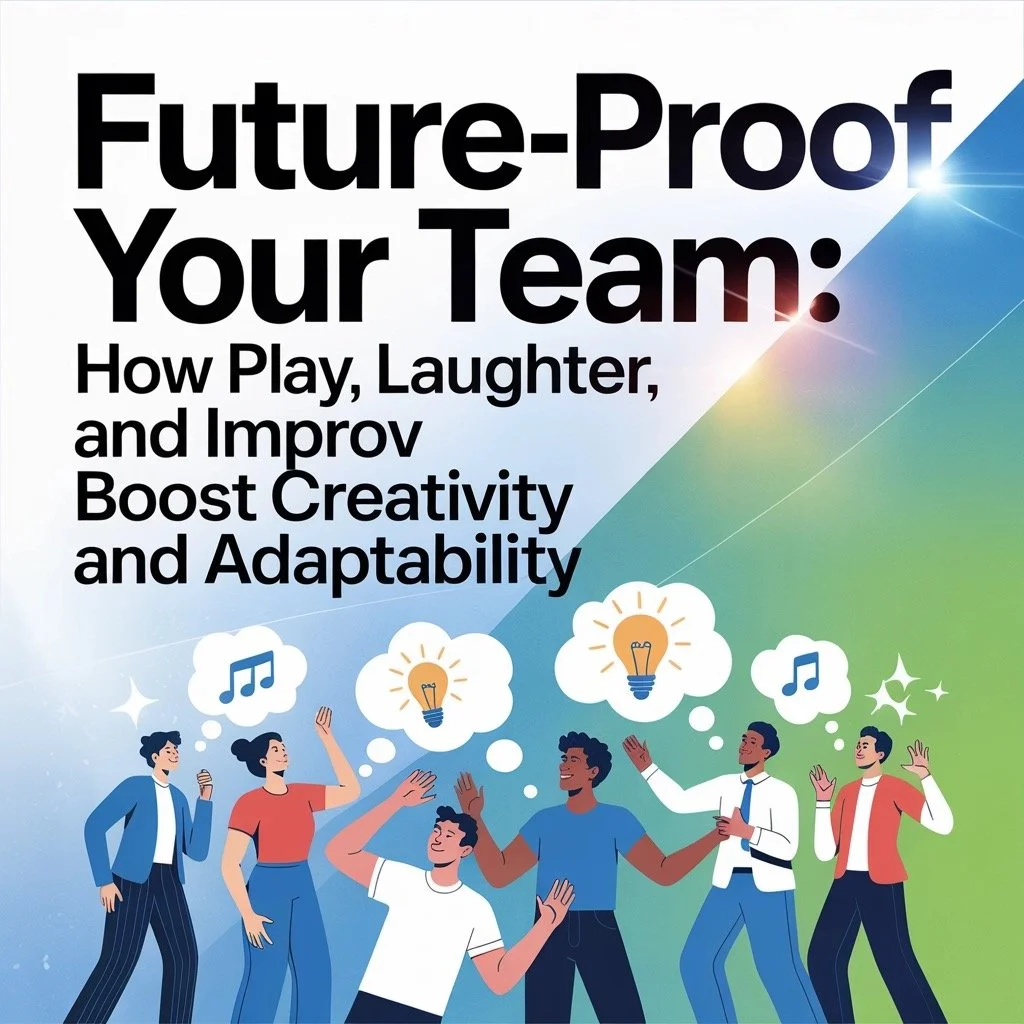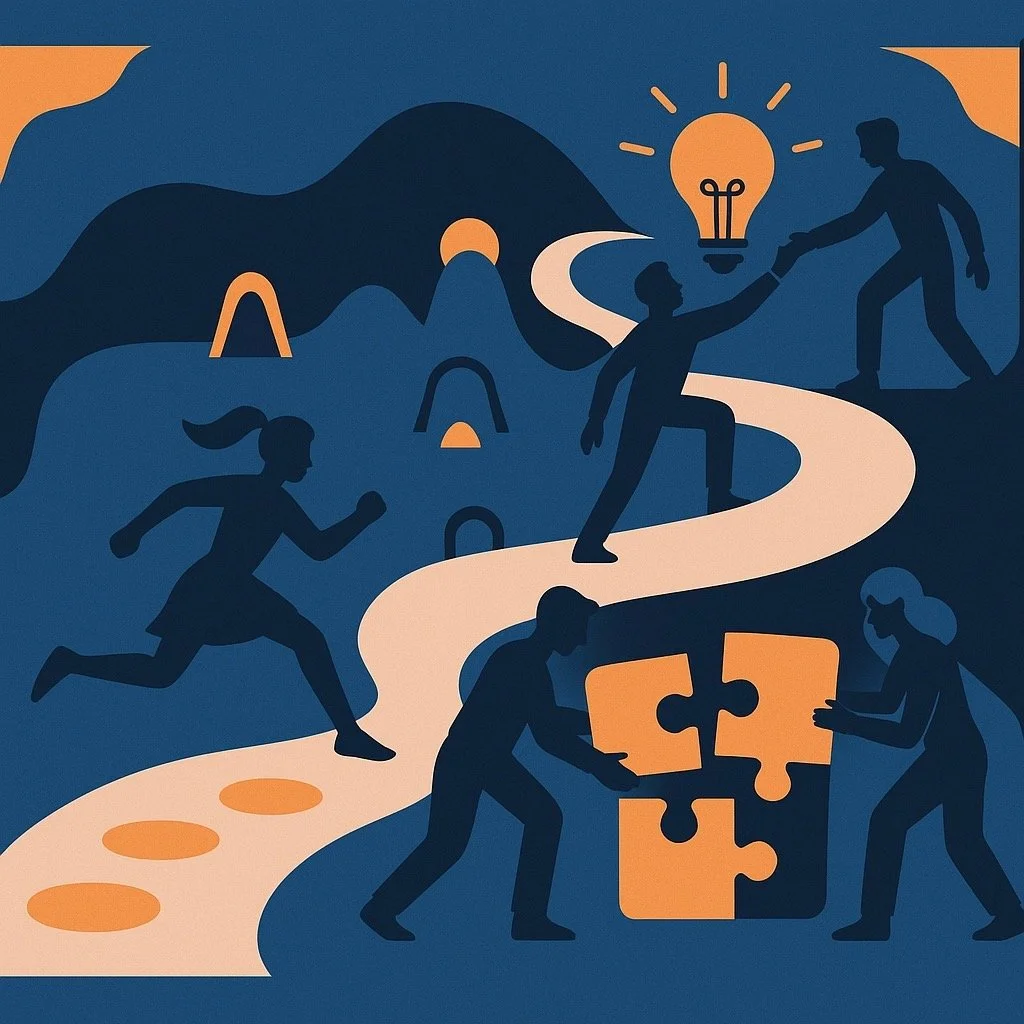Future-Proof Your Team: How Play, Laughter, and Improv Boost Creativity and Adaptability
In today’s ever-evolving business world, simply running trust falls and handing out corporate swag won’t cut it. Teams need something much deeper—and way more fun—to build lasting creativity and adaptability. That’s where play, laughter, and improv come in. These aren't just icebreakers; they're science-backed keys to unleashing innovation, flexibility, and high-performing teams.
Why Play and Laughter Belong at Work
Let’s be real: despite all those “innovative” workplace perks, most offices still feel like, well…offices. Playfulness gets left at the door, but that’s a huge missed opportunity.
Playfulness lowers social barriers and gets people thinking creatively—fast. Laughter isn’t just about fun (although you’ll get plenty of that). It releases endorphins, builds bonds, and signals to your brain that it’s safe to take risks and think differently. In environments built on play, teams brainstorm bolder ideas, break out of stuck thinking, and actually enjoy collaborating.
Improv: Not Just For Comedians (Or Extroverts)
Forget standing awkwardly in a circle and pretending to be a tree (unless you’re into that—no shade!). Improv in the workplace is about training the brain to respond positively to curveballs, welcome new perspectives, and build on each other’s ideas. It’s grounded in the principle that there are no bad ideas—only opportunities to play, build, and learn.
Improv teaches teams to:
Actively listen instead of planning their next point
Accept and embrace new ideas (“yes, and…”)
Respond with confidence to unexpected challenges
Support one another—even (especially!) when mistakes happen
This means less “that’s not my job,” and more, “Let’s make it work together.”
The Science: How Improv Boosts Brains for the Future
Cognitive Flexibility
Modern improv is basically brain gym. Exercises like rapid-fire storytelling or on-the-fly scene-building ask participants to switch gears, adapt to shifting circumstances, and genuinely let go of control. Research shows that this strengthens cognitive flexibility, which is the ability to shift thinking and adjust strategies when the situation changes. In a world where yesterday’s best solution might be today’s obsolete hack, this is pure gold.
Divergent Thinking
Improv isn’t about memorising punchlines; it’s about generating multiple solutions quickly. This is divergent thinking in action, and it’s essential for creativity. You’re not just looking for a solution—you're exploring many possible solutions, tapping into unexpected connections, and discovering “aha!” moments that stale meetings just can’t produce.
Psychological Safety & Trust
When the stakes are low, laughter and silly scenarios make it safe to get things wrong. This builds psychological safety—which Harvard’s Dr. Amy Edmondson found to be the top factor in high-performing teams. The result? Teams who aren’t afraid to speak up, toss out wild ideas, and give honest feedback without worrying about looking foolish.
Real Results: What Actually Changes After Improv Training?
Think improv is all theory? Here’s what businesses see after they add play, laughter, and improv to their team-building toolbox:
Meetings Go From Painful to Productive
Instead of stale status updates, improv-trained teams turn meetings into creative problem-solving jams. Brainstorming isn’t one lone voice at the whiteboard—it’s a collective, supportive “Yes, and…” session where even the intern’s far-out idea gets a fair shake.
Adaptability Becomes Second Nature
Unexpected product issue? Market shift? Suddenly you need to run your business on three Zoom meetings and a prayer? Teams skilled in improv are ready. They’ve rehearsed adapting in crunch time, so change registers as exciting, not exhausting.
Collaboration and Communication Level Up
Improv makes it hard to dominate, tune out, or hold grudges—the games just don’t work unless everyone participates and builds on input from others. Teams become more cohesive, communication gets clearer, and barriers between silos start to vanish.
Resilience Gets Real
Work will always throw curveballs. The difference is, improv-trained teams roll with disruption, learn on the fly, and bounce back stronger. This resilience is what makes them “future-proof” when the next big challenge pops up.
How To Bring Improv and Play Into Your Workplace
Bringing play, laughter, and improv to work shouldn’t feel forced or cringeworthy. Success comes down to relatable, low-pressure experiences designed for all personality types—not just the natural comedians.
Tips for effective implementation:
Start Small: Intro games that focus on listening, collaboration, and celebration of mistakes. Make it safe and optional at first.
Hire Facilitators Who Get It: Seek out workshop leaders (hey, like Chatterbox Workshops!) who balance humour with real business insight. They’ll connect the dots between improv games and on-the-job challenges.
Link It To Real Work: After a session, reflect together—how did that playful moment shift your thinking? Where could “yes, and…” work in your next project meeting?
Make It Ongoing: One-off workshops are fun, but regular play-ins (even just 10 minutes tacked onto a meeting) drive real culture change.
Embrace All Roles: Encourage everyone to participate, not just the usual suspects. Improv thrives on diversity of thought and experience.
Playing For the Long Haul
The strongest future-proof teams see training not as a single event but as a way of being. They’re curious, adaptable, and know that a little laughter (and lots of play) is fuel for serious progress. In a sea of sameness, playful teams are the ones that leap ahead while everyone else is stuck in yesterday’s routines.
If you’re ready to ditch the boring icebreakers and build teams ready for whatever the future holds, improv-based training is your competitive edge. It’s time to get a little silly—and a lot more successful. Want more on how to make your team future-ready? Check out our insights or explore our hands-on workshops.
For even more ways to make your workplace a hub of creativity and resilience, don’t miss our article on Why Boring Team Building is Out: The Rise of Human-Centred Corporate Workshops.
Ready to future-proof your team with play, laughter, and improv? Learn more at Chatterbox Workshops.




